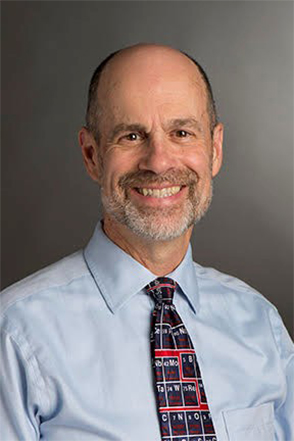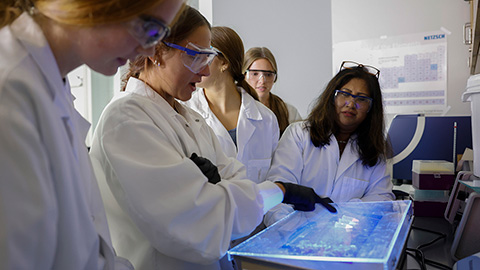The BASIL blueprint for biochem labs
With more than 30 years of experience under his belt, Paul Craig has learned what works when it comes to teaching undergrads. As he applied his knowledge and modified his teaching style to empower students to feel like researchers themselves, he noticed a distinct change.
“The interaction became more like working side by side,” Craig said. “Once they realized I did not know the answers to the questions they were asking, the students got more adventurous, looking online and in the literature for answers to those very questions.”

To benefit educators and students at large, Craig and colleagues developed the Biochemistry Authentic Scientific Inquiry Lab, or BASIL, initiative. This undergraduate lab course curriculum encourages students to use lab techniques to figure out the function of a protein, giving them firsthand experience as researchers.
Craig has been a professor in the School of Chemistry and Materials Science at the Rochester Institute of Technology since 1993. As his career evolved, Craig turned his scientific curiosity toward how students learn — and how to teach them to think like researchers.
“I wanted students to learn how to become scientists, not just learn the techniques,” he said. “(This includes) understanding how to read the literature, ask questions and overcome failure.”
In the BASIL curriculum, students work with proteins with unknown functions and use computational and bioinformatic tools to make functional predictions. They then test these predictions in the lab by relying on techniques including gene cloning, protein expression and purification and enzyme assays.
BASIL began in 2015 when Craig and a group of committed colleagues set out to redesign the undergraduate biochemistry lab from the ground up. Over time, the team refined BASIL with support from the National Science Foundation. They launched a website that houses modules, instructions and other resources. Today, Craig estimates the program runs on more than 50 campuses across the country.
For those looking to develop a successful curriculum like BASIL, Craig said it’s important to have a framework. A structured plan helps ensure that key learning components are included and that the course is designed effectively.
“Have learning objectives and learning goals,” he said. “For biochemistry, if you are redeveloping a course or building a new course, look at the curriculum recommendations from (the American Society for Biochemistry and Molecular Biology) — they are well thought out.”
He advises tailoring the course to students’ experience levels and backgrounds.
“Are they taking this course in their second year or fourth year? What (background) do they have?” he said. “It’s important to challenge (students) and give them opportunities where they’re stretched.”
BASIL immerses students in authentic scientific research, including the frustrating — and often illuminating — failures working scientists routinely face. Craig encourages instructors to be open and honest about their own failures to support students and normalize failure as a part of the scientific process.
“Faculty need to be honest with students about when we failed and almost walked away and what kept (us) there and how (we) managed to work through it,” Craig said.
He previously spoke to ASBMB about his own impostor syndrome.
Lastly, Craig also encourages faculty to make connections with fellow educators. The ASBMB annual meeting is one such venue.
“I’ve learned so much from being around other educators (by) going to the ASBMB meeting,” Craig said.
Enjoy reading ASBMB Today?
Become a member to receive the print edition four times a year and the digital edition monthly.
Learn moreGet the latest from ASBMB Today
Enter your email address, and we’ll send you a weekly email with recent articles, interviews and more.
Latest in Education
Education highlights or most popular articles

Summer research spotlight
The 2025 Undergraduate Research Award recipients share results and insights from their lab experiences.

Creating change in biochemistry education
Pamela Mertz will receive the ASBMB William C. Rose Award for Exemplary Contributions to Education at the ASBMB Annual Meeting, March 7-10 in Washington, D.C.

Trainee mentorship as immortality
Suzanne Barbour will receive the ASBMB Sustained Leadership Award at the ASBMB Annual Meeting, March 7-10 in Washington, D.C.

Redefining excellence to drive equity and innovation
Donita Brady will receive the ASBMB Ruth Kirschstein Award for Maximizing Access in Science at the ASBMB Annual Meeting, March 7–10, just outside of Washington, D.C.

Debugging my code and teaching with ChatGPT
AI tools like ChatGPT have changed the way an assistant professor teaches and does research. But, he asserts that real growth still comes from struggle, and educators must help students use AI wisely — as scaffolds, not shortcuts.

How AlphaFold transformed my classroom into a research lab
A high school science teacher reflects on how AI-integrated technologies help her students ponder realistic research questions with hands-on learning.

